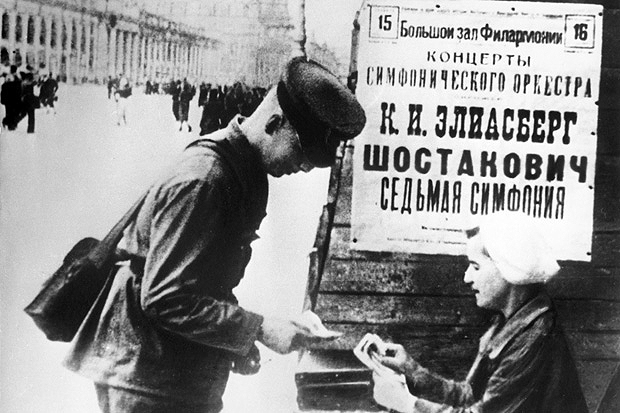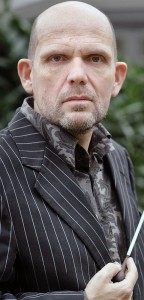In recent years the Chicago Symphony Orchestra has closed its seasons with multi-week spring festivals. The topics have been wildly varied: a Beethoven festival in 2010, piano-focused concerts in 2012, an exploration of rivers and nature in 2013.
This spring offers a duo festival of sorts. CSO Music Director Riccardo Muti will be back on the podium June 12-21 to finish his season-long survey of Schubert symphonies. But just before he returns, conductor Jaap van Zweden, music director of the Dallas Symphony and a favorite with CSO audiences, will lead the CSO in three weeks of concerts (May 22-June 8) focused on the topic of Truth to Power and devoted to the music of Dmitri Shostakovich, Sergei Prokofiev and Benjamin Britten.
From the 1930s through the 1950s, Shostakovich and Prokofiev found themselves ensnared in the convoluted cultural politics of Stalin’s Soviet Union. British composer Britten was a pacifist during the early years of World War II, and though he never fully came out as a homosexual, lived openly with his longtime partner, the distinguished tenor Peter Pears.
“These three composers had their difficulties, but they were all different,” van Zweden said. “Shostakovich had the difficulty of the pressure of the government. Prokofiev left his country and then he got really homesick. [Shortly after the Russian Revolution of 1917, the composer, then his mid-20s, left his homeland for Europe, only to return in 1936, remaining until his death in 1953.] What happens if you get so homesick? And then Benjamin Britten was struggling, maybe, with his homosexuality. So how was that influencing him? There were different aspects, but these were all difficult moments in their lives. In dirt, sometimes very beautiful flowers grow.”
 Highlights of the festival will include performances May 22-24 of Shostakovich’s Symphony No. 7 (Leningrad), a portrait of the composer’s hometown now known as St. Petersburg. It’s a wrenching work, written in December 1941 when the city was under relentless attack by the Nazis. Shostakovich’s Symphony No. 9, composed shortly after the war ended in 1945, is scheduled for May 29-30. His Symphony No. 5, a 1937 response to withering attacks on his music for so-called formalism and elitist complexity that were launched in 1936 by Stalin himself, will close the festival June 5-8.
Highlights of the festival will include performances May 22-24 of Shostakovich’s Symphony No. 7 (Leningrad), a portrait of the composer’s hometown now known as St. Petersburg. It’s a wrenching work, written in December 1941 when the city was under relentless attack by the Nazis. Shostakovich’s Symphony No. 9, composed shortly after the war ended in 1945, is scheduled for May 29-30. His Symphony No. 5, a 1937 response to withering attacks on his music for so-called formalism and elitist complexity that were launched in 1936 by Stalin himself, will close the festival June 5-8.
Prokofiev’s Symphony No. 5, a work from early 1945 that the composer described as “a hymn to free and happy man,” is the focus of CSO concerts May 31 and June 3, as well as a Beyond the Score program June 4 with van Zweden and the Civic Orchestra. Pianist Vladimir Feltsman will perform Prokofiev’s Sonata No. 6 during a recital June 1. Britten’s orchestral Suite on English Folk Tunes, A time there was…, will be performed May 29-30. The festival also includes his Sinfonia da requiem May 31 and June 3, and the Violin Concerto with soloist Simone Lamsma on June 5-8.
The CSO is partnering with the Poetry Foundation for this festival, and the schedule will include lectures May 13 at the Poetry Foundation and May 19 at the University of Chicago, as well as pre-concert discussions and film segments May 22-June 8 in Symphony Center.
“I think that many of us, and many in our audience, really are curious and life-long learners,” said Martha Gilmer, the CSO’s vice president for artistic administration. “We have a wide range of interests. And one of the things a festival does is it brings the composer back into the room, into the discussion. We try to reveal why a piece was written, when it was written, what was the context. Sometimes the context is about political change or social issues, sometimes nature itself and reflection on the natural world. To me, that’s a really important part — not just the harmonic structure or the form of the piece.”
Gilmer works closely with Gerard McBurney, the CSO’s artistic programming advisor, who also oversees the CSO’s Beyond the Score productions. They knew van Zweden was interested in participating in a festival, and the three began discussing possible themes. As they talked, they recalled that the CSO’s very first spring event, in 1999, was a Shostakovich festival conducted by cellist Mstislav Rostropovich. Rostropovich and Shostakovich were very close friends, and the cellist also was very close to Britten. Gradually the links between Shostakovich and Britten came into focus with Prokofiev as a natural addition.
 McBurney recalls a trip he and Gilmer made to Dallas to hash out the festival’s focus. According to McBurney, van Zweden said, “I’m wondering about Shostakovich and Prokofiev around the period of the Second World War. I just love that big-boned, public music that those guys were writing.”
McBurney recalls a trip he and Gilmer made to Dallas to hash out the festival’s focus. According to McBurney, van Zweden said, “I’m wondering about Shostakovich and Prokofiev around the period of the Second World War. I just love that big-boned, public music that those guys were writing.”
“He felt that this was music particularly suited to the strengths of this orchestra,” McBurney said. “It’s public music addressed to a very, very broad public and associated with tremendous social upheavals.”
The idea that these composers wanted to reach a mass audience, that they wanted their music to be part of a conversation about life-or-death social or political issues, resonated with McBurney. For much of the 20th century, he said, composers of the modernist school stood aloof, concerned more with arcane issues of musical form and structure than with speaking directly to an audience. But society was moving in a different direction, one that Shostakovich, Britten and Prokofiev understood. Though they often had to navigate political waters that were extremely dangerous to them personally, they wanted their voices to be heard.
“The 20th century is the great age of mass culture, of film and television and recordings and radio,” said McBurney, citing the thesis of critic Alex Ross’ influential 2007 book, The Rest Is Noise. “The more original invention of the 20th century is the idea of the artist as populist, the artist addressing enormous audiences in ways that had never been addressed before because you now had mass media.”
Shostakovich, Prokofiev and Britten embraced that expanded audience. All three wrote film scores, McBurney pointed out, and were pioneers in writing music for children. “In the exception of a few youthful works,” said McBurney, “their entire careers were predicated on this idea of writing for mass audiences, writing in an idiom that’s strong, dark, rousing, designed to provoke huge listenership to having very strong moral reactions.
“These guys had no fear of leaving the high-art citadel,” said McBurney, “of taking the high-art message but making it immediately graspable by a much, much broader audience.”
Wynne Delacoma, classical music critic for the Chicago Sun-Times from 1991 to 2006, is a Chicago-based writer and lecturer.
PHOTOS: A detail from the painting Woman in Recline: The Siege of Leningrad by Felix Lembersky. INSET RIGHT: A soldier purchases a ticket to premiere of Shostakovich’s Symphony No. 7 (Leningrad). INSET LEFT: Jaap van Zweden.